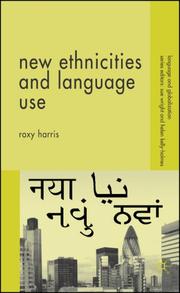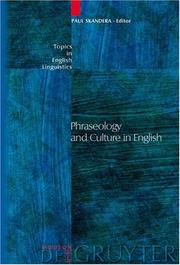| Listing 1 - 7 of 7 |
Sort by
|
Book
ISBN: 9027422893 Year: 1989 Publisher: Utrecht Het Spectrum
Abstract | Keywords | Export | Availability | Bookmark
 Loading...
Loading...Choose an application
- Reference Manager
- EndNote
- RefWorks (Direct export to RefWorks)
Foreign trade. International trade --- Zakenleven --- Engelstalige landen --- Engelstalige landen.
Book
Year: 1986 Publisher: Oxford Toronto Frankfurt Pergamon
Abstract | Keywords | Export | Availability | Bookmark
 Loading...
Loading...Choose an application
- Reference Manager
- EndNote
- RefWorks (Direct export to RefWorks)
Book
ISBN: 0674018192 Year: 2004 Publisher: Cambridge, MA ; London : Harvard University Press,
Abstract | Keywords | Export | Availability | Bookmark
 Loading...
Loading...Choose an application
- Reference Manager
- EndNote
- RefWorks (Direct export to RefWorks)
Amerikaanse letterkunde --- Contactlinguïstiek --- Dialect in de Amerikaanse letterkunde. --- Dialect in de Engelse letterkunde. --- Engelse letterkunde --- Engelse taal --- Minderheden in de literatuur. --- Multiculturalisme in de literatuur. --- Geschiedenis en kritiek. --- Engelstalige landen. --- Geschiedenis en kritiek --- Varianten.

ISBN: 9781403998941 Year: 2006 Publisher: Basingstoke [etc.] : Palgrave Macmillan,
Abstract | Keywords | Export | Availability | Bookmark
 Loading...
Loading...Choose an application
- Reference Manager
- EndNote
- RefWorks (Direct export to RefWorks)
Adolescenten --- Antropologische linguïstiek. --- Aziatische jongeren --- Engelse taal --- Etniciteit --- Etnolinguïstiek. --- Groepsidentiteit --- Interculturele communicatie. --- Linguïstische antropologie --- Rassen --- Sociolinguïstiek. --- Taal en culturele identiteit --- Taal en cultuur --- Groot-Brittannië. --- sociale aspecten --- Engelstalige landen.

ISSN: 14343452 ISBN: 9783110190878 3110190877 9786612194221 1282194224 3110197863 9783110197860 Year: 2007 Volume: 54 Publisher: Berlin Mouton de Gruyter
Abstract | Keywords | Export | Availability | Bookmark
 Loading...
Loading...Choose an application
- Reference Manager
- EndNote
- RefWorks (Direct export to RefWorks)
The proposition that there is a correlation between language and culture or culture-specific ways of thinking can be traced back to the views of Herder and von Humboldt in the late 18th and early 19th centuries. It is generally accepted today that a language, especially its lexicon, influences its speakers' cultural patterns of thought and perception in various ways, for example through a culture-specific segmentation of the extralinguistic reality, the frequency of occurrence of particular lexical items, or the existence of keywords or key word combinations revealing core cultural values. The aim of this volume is to explore the cultural dimension of a wide range of preconstructed or semi-preconstructed word combinations in English. The 17 papers of the volume are divided into four sections, focusing on particular lexemes (e.g. enjoy and its collocates), types of word combinations (e.g. proverbs and similes), use-related varieties (such as the language of tourism or answering-machine messages), and user-related varieties (such as Aboriginal English or African English). The sections are preceded by a prologue, tracing the development of the study of formulaic language, and followed by an epilogue, which draws together the threads laid out in the various papers. The relation between language and culture in general has been explored in a number of important works over the past ten years. However, the study of the relation between English phraseology and culture in particular has been largely neglected. This volume is the first book-length publication devoted entirely to this topic.
English language --- Language and culture --- Linguistic geography --- Group identity --- Social aspects --- Variation --- English-speaking countries --- Civilization --- Engelse taal --- Linguïstische geografie. --- Taal en culturele identiteit --- Taal en cultuur --- collocaties. --- fraseologie. --- sociale aspecten. --- varianten. --- Engelstalige landen. --- Sociolinguistics --- Dialectology --- Linguistic geography. --- Variation. --- Civilization. --- Collective identity --- Community identity --- Cultural identity --- Social identity --- Dialect geography --- Geography, Linguistic --- Language and languages --- Language geography --- Geography --- Anglophone countries --- Countries, English-speaking --- Identity (Psychology) --- Social psychology --- Collective memory --- Areal linguistics --- Germanic languages --- Dialects --- Countries, Anglophone --- Culture --- English language - Social aspects - English-speaking countries --- Language and culture - English-speaking countries --- English language - Variation --- Group identity - English-speaking countries --- English-speaking countries - Civilization --- English/language. --- Phraseology.
Book
ISBN: 9780230230071 0230230075 1137292113 1283868040 1349311170 Year: 2013 Publisher: Basingstoke ; New York : Palgrave Macmillan,
Abstract | Keywords | Export | Availability | Bookmark
 Loading...
Loading...Choose an application
- Reference Manager
- EndNote
- RefWorks (Direct export to RefWorks)
Despite a stated commitment to cross-cultural solidarity, trauma theory—an area of cultural investigation that emerged out of the 'ethical turn' affecting the humanities in the 1990s—is marked by a Eurocentric, monocultural bias. This book takes issue with the tendency of the founding texts of the field to marginalize or ignore traumatic experiences of non-Western or minority groups, and to take for granted the universal validity of definitions of trauma and recovery that have developed out of the history of Western modernity. Moreover, it questions the assumption that a modernist aesthetic of fragmentation and aporia is uniquely suited to the task of bearing witness to trauma, and criticizes the neglect of the connections between metropolitan and non-Western or minority traumas. Combining theoretical argument with literary case studies, Postcolonial Witnessing contends that the suffering engendered by colonialism needs to be acknowledged more fully, on its own terms, in its own terms, and in relation to traumatic First World histories if trauma theory is to have any hope of redeeming its promise of cross-cultural ethical engagement.
English literature --- Psychic trauma in literature. --- Postcolonialism in literature. --- Wounds and injuries in literature. --- Literature and society. --- Littérature anglaise --- Traumatisme psychique dans la littérature --- Postcolonialisme dans la littérature --- Lésions et blessures dans la littérature --- Littérature et société --- Minority authors --- History and criticism. --- Ecrivains issus des minorités --- Histoire et critique --- Psychic trauma in literature --- Postcolonialism in literature --- Wounds and injuries in literature --- Literature and society --- History and criticism --- Trauma (letterkunde) --- English-language literature --- Postkolonialisme in de letterkunde --- Postkolonialisme --- Engelse letterkunde --- Engelstalige landen --- geschiedenis en kritiek --- #SBIB:39A4 --- #SBIB:39A5 --- Literature --- Literature and sociology --- Society and literature --- Sociology and literature --- Sociolinguistics --- British literature --- Inklings (Group of writers) --- Nonsense Club (Group of writers) --- Order of the Fancy (Group of writers) --- Toegepaste antropologie --- Kunst, habitat, materiële cultuur en ontspanning --- Social aspects --- Trauma (letterkunde). --- English-language literature. --- Postkolonialisme in de letterkunde. --- Engelstalige landen. --- geschiedenis en kritiek. --- Littérature anglaise --- Traumatisme psychique dans la littérature --- Postcolonialisme dans la littérature --- Lésions et blessures dans la littérature --- Littérature et société --- Ecrivains issus des minorités --- Geschiedenis en kritiek. --- Minority authors&delete& --- English literature - Minority authors - History and criticism
Book
ISBN: 0582522811 9780582522817 Year: 1975 Publisher: London Longman
Abstract | Keywords | Export | Availability | Bookmark
 Loading...
Loading...Choose an application
- Reference Manager
- EndNote
- RefWorks (Direct export to RefWorks)
Great Britain --- United States --- English-speaking countries --- Encyclopedias --- 914.20 --- 917 --- Engelstalige landen - encyclopedie --- -Great Britain --- Anglophone countries --- Countries, English-speaking --- Encyclopedias. --- Countries, Anglophone --- ABŞ --- ABSh --- Ameerika Ühendriigid --- America (Republic) --- Amerika Birlăshmish Shtatlary --- Amerika Birlăşmi Ştatları --- Amerika Birlăşmiş Ştatları --- Amerika ka Kelenyalen Jamanaw --- Amerika Qūrama Shtattary --- Amerika Qŭshma Shtatlari --- Amerika Qushma Shtattary --- Amerika (Republic) --- Amerikai Egyesült Államok --- Amerikanʹ Veĭtʹsėndi︠a︡vks Shtattnė --- Amerikări Pĕrleshu̇llĕ Shtatsem --- Amerikas Forenede Stater --- Amerikayi Miatsʻyal Nahangner --- Ameriketako Estatu Batuak --- Amirika Carékat --- AQSh --- Ar. ha-B. --- Arhab --- Artsot ha-Berit --- Artzois Ha'bris --- Bí-kok --- Ē.P.A. --- EE.UU. --- Egyesült Államok --- ĒPA --- Estados Unidos --- Estados Unidos da América do Norte --- Estados Unidos de América --- Estaos Xuníos --- Estaos Xuníos d'América --- Estatos Unitos --- Estatos Unitos d'America --- Estats Units d'Amèrica --- Ètats-Unis d'Amèrica --- États-Unis d'Amérique --- Fareyniḳṭe Shṭaṭn --- Feriene Steaten --- Feriene Steaten fan Amearika --- Forente stater --- FS --- Hēnomenai Politeiai Amerikēs --- Hēnōmenes Politeies tēs Amerikēs --- Hiwsisayin Amerikayi Miatsʻeal Tērutʻiwnkʻ --- Istadus Unidus --- Jungtinės Amerikos valstybės --- Mei guo --- Mei-kuo --- Meiguo --- Mî-koet --- Miatsʻyal Nahangner --- Miguk --- Na Stàitean Aonaichte --- NSA --- S.U.A. --- SAD --- Saharat ʻAmērikā --- SASht --- Severo-Amerikanskie Shtaty --- Severo-Amerikanskie Soedinennye Shtaty --- Si︠e︡vero-Amerikanskīe Soedinennye Shtaty --- Sjedinjene Američke Države --- Soedinennye Shtaty Ameriki --- Soedinennye Shtaty Severnoĭ Ameriki --- Soedinennye Shtaty Si︠e︡vernoĭ Ameriki --- Spojené staty americké --- SShA --- Stadoù-Unanet Amerika --- Stáit Aontaithe Mheiriceá --- Stany Zjednoczone --- Stati Uniti --- Stati Uniti d'America --- Stâts Unîts --- Stâts Unîts di Americhe --- Steatyn Unnaneysit --- Steatyn Unnaneysit America --- SUA (Stati Uniti d'America) --- Sŭedineni amerikanski shtati --- Sŭedinenite shtati --- Tetã peteĩ reko Amérikagua --- U.S. --- U.S.A. --- United States of America --- Unol Daleithiau --- Unol Daleithiau America --- Unuiĝintaj Ŝtatoj de Ameriko --- US --- USA --- Usono --- Vaeinigte Staatn --- Vaeinigte Staatn vo Amerika --- Vereinigte Staaten --- Vereinigte Staaten von Amerika --- Verenigde State van Amerika --- Verenigde Staten --- VS --- VSA --- Wááshindoon Bikéyah Ałhidadiidzooígíí --- Wilāyāt al-Muttaḥidah --- Wilāyāt al-Muttaḥidah al-Amirīkīyah --- Wilāyāt al-Muttaḥidah al-Amrīkīyah --- Yhdysvallat --- Yunaeted Stet --- Yunaeted Stet blong Amerika --- ZDA --- Združene države Amerike --- Zʹi︠e︡dnani Derz︠h︡avy Ameryky --- Zjadnośone staty Ameriki --- Zluchanyi︠a︡ Shtaty Ameryki --- Zlucheni Derz︠h︡avy --- ZSA --- Η.Π.Α. --- Ηνωμένες Πολιτείες της Αμερικής --- Америка (Republic) --- Американь Вейтьсэндявкс Штаттнэ --- Америкӑри Пӗрлешӳллӗ Штатсем --- САЩ --- Съединените щати --- Злучаныя Штаты Амерыкі --- ولايات المتحدة --- ولايات المتّحدة الأمريكيّة --- ولايات المتحدة الامريكية --- 미국 --- Spojené obce severoamerické --- États-Unis --- É.-U. --- ÉU --- Great Britain - Encyclopedias --- United States - Encyclopedias --- English-speaking countries - Encyclopedias
| Listing 1 - 7 of 7 |
Sort by
|

 Search
Search Feedback
Feedback About UniCat
About UniCat  Help
Help News
News